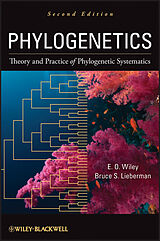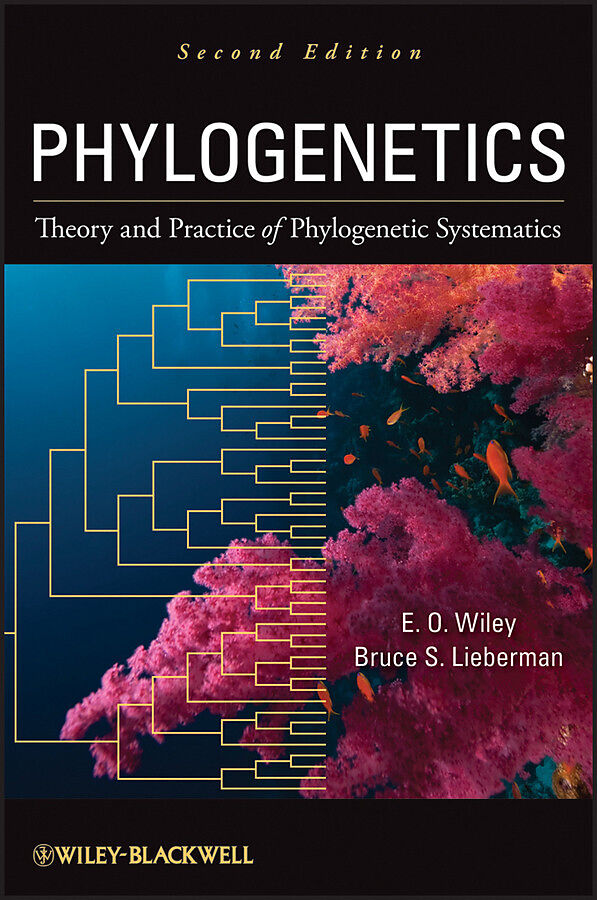Phylogenetics
Format:
E-Book (EPUB)
EAN:
9781118017876
Untertitel:
Theory and Practice of Phylogenetic Systematics
Genre:
Sonstiges
Autor:
E. O. Wiley, Bruce S. Lieberman
Herausgeber:
Wiley-Blackwell
Auflage:
2. Aufl.
Anzahl Seiten:
424
Erscheinungsdatum:
11.10.2011
ISBN:
978-1-118-01787-6
The long-awaited revision of the industry standard on
phylogenetics
Since the publication of the first edition of this landmark
volume more than twenty-five years ago, phylogenetic systematics
has taken its place as the dominant paradigm of systematic biology.
It has profoundly influenced the way scientists study evolution,
and has seen many theoretical and technical advances as the field
has continued to grow. It goes almost without saying that the next
twenty-five years of phylogenetic research will prove as
fascinating as the first, with many exciting developments yet to
come.
This new edition of Phylogenetics captures the very
essence of this rapidly evolving discipline. Written for the
practicing systematist and phylogeneticist, it addresses both the
philosophical and technical issues of the field, as well as surveys
general practices in taxonomy. Major sections of the book deal with
the nature of species and higher taxa, homology and characters,
trees and tree graphs, and biogeography--the purpose being to
develop biologically relevant species, character, tree, and
biogeographic concepts that can be applied fruitfully to
phylogenetics.
The book then turns its focus to phylogenetic trees, including
an in-depth guide to tree-building algorithms. Additional coverage
includes:
* Parsimony and parsimony analysis
* Parametric phylogenetics including maximum likelihood and
Bayesian approaches
* Phylogenetic classification
* Critiques of evolutionary taxonomy, phenetics, and transformed
cladistics
* Specimen selection, field collecting, and curating
* Systematic publication and the rules of nomenclature
Providing a thorough synthesis of the field, this important
update to Phylogenetics is essential for students and
researchers in the areas of evolutionary biology, molecular
evolution, genetics and evolutionary genetics, paleontology,
physical anthropology, and zoology.
Autorentext
Professor Wiley is Emeritus Professor of Ecology and evolutionary
Biology at the University of Kansas. Currently he works in
the University of Kansas Natural History Museum. Professor
Wiley's distinguished career is marked by hundreds of peer-reviewed
papers, a continuous string of research grants, including his
current NSF grant, "Assembling the Euteleost Tree of Life," and the
publication of 5 books.
Professor Lieberman is an Invertebrate Paleontologist at
University of Kansas. Professor Lieberman has also authored
five books as well as numerous peer reviewed publications.
His long string of research grants culminates most recently with an
NSF grant to study "Revisionary systematic of Cheirurid
Trilobites."
Zusammenfassung
The long-awaited revision of the industry standard on phylogenetics Since the publication of the first edition of this landmark volume more than twenty-five years ago, phylogenetic systematics has taken its place as the dominant paradigm of systematic biology. It has profoundly influenced the way scientists study evolution, and has seen many theoretical and technical advances as the field has continued to grow. It goes almost without saying that the next twenty-five years of phylogenetic research will prove as fascinating as the first, with many exciting developments yet to come. This new edition of Phylogenetics captures the very essence of this rapidly evolving discipline. Written for the practicing systematist and phylogeneticist, it addresses both the philosophical and technical issues of the field, as well as surveys general practices in taxonomy. Major sections of the book deal with the nature of species and higher taxa, homology and characters, trees and tree graphs, and biogeographythe purpose being to develop biologically relevant species, character, tree, and biogeographic concepts that can be applied fruitfully to phylogenetics. The book then turns its focus to phylogenetic trees, including an in-depth guide to tree-building algorithms. Additional coverage includes: Parsimony and parsimony analysis Parametric phylogenetics including maximum likelihood and Bayesian approaches Phylogenetic classification Critiques of evolutionary taxonomy, phenetics, and transformed cladistics Specimen selection, field collecting, and curating Systematic publication and the rules of nomenclature Providing a thorough synthesis of the field, this important update to Phylogenetics is essential for students and researchers in the areas of evolutionary biology, molecular evolution, genetics and evolutionary genetics, paleontology, physical anthropology, and zoology.
Inhalt
Preface to the Second Edition. Preface to the First Edition. Chapter 1. Introduction. Phylogenetic Propositions. Topics Covered. Terms and Concepts. Disciplines. Organisms and Grouping of Organisms. Phylogenetic History and Evolution. Attributes of Organisms. Classification. Philosophy and Systematics. The Form of Phylogenetic Hypotheses. Chapter Summary. Chapter 2. Species and Speciation. What Is It to Be a Species? Species as Kinds. Species as Sets. Species as Individuals. Species Concepts. Process-Based Concepts. The Evolutionary Species Concept. Justifications for the ESC. Variations on the ESC. Process-Based Concepts Emphasizing Reproductive Isolation. Phylogenetic Species Concepts. Some Additional Species Concepts. Sorting through Species Concepts. Speciation: Modes and Patterns. Allopartic Speciation. Allopartic Mode I: Vicariance. Allopatric Speciation, Mode II Peripatric Speciation. Distinguishing between Allopatric Modes of Speciation. Parapatric Speciation. Sympatric Speciation. Identifying Modes of Speciation in the Fossil Record. The Evolutionary Species Concept, Speciation, and Ecology. Empirical Methods for Determining Species Limits. Nontree-Based Methods. Tree-Based Methods. Chapter Summary. Chapter 3. Supraspecific Taxa. Concepts of Naturalness and Supraspecific Taxa. The Natural Taxon. Monophyly, Paraphyly and Polyphyly. Hennig's Concepts Placed in History. Natural Higher Taxa as Monophyletic Groups sensu Hennig (1966). Logical Consistency: The Hallmark of Proposed Natural Classifi cations. Paraphyletic Groups Misrepresent Character Evolution. Paraphyly and Polyphyly: Two Forms of Nonmonophyly. Node-Based and Stem-Based Monophyly: Same Concept Different Graphs. Chapter Summary. Chapter 4. Tree Graphs. Phylogenetic Trees. Stem-Based Phylogenetic Trees. Node-Based Phylogenetic Trees. Cyclic Graphs. Cladograms. Nelson Trees in Phylogenetics. From Nelson Trees to Phylogenetic Trees. Gene Trees. Individuals versus Sets of Individuals Used in an Analysis. Representing Character Evolution on Trees. Unrooted Trees and Their Relationship to Phylogenetic Trees. Node Rotation. Other Kinds of Tree Terminology. Concepts of Monophyly and Trees. Chapter Summary. Chapter 5. Characters and Homology. A Concept of Character. Character States as Properties. Shared Character States. Historical Character States as Properties. Ahistorical Kind Properties. Historical Groups and Natural Kinds. Homology.

Leider konnten wir für diesen Artikel keine Preise ermitteln ...
billigbuch.ch sucht jetzt für Sie die besten Angebote ...
Die aktuellen Verkaufspreise von 3 Onlineshops werden in Realtime abgefragt.
Sie können das gewünschte Produkt anschliessend direkt beim Anbieter Ihrer Wahl bestellen.
Loading...
Die aktuellen Verkaufspreise von 3 Onlineshops werden in Realtime abgefragt.
Sie können das gewünschte Produkt anschliessend direkt beim Anbieter Ihrer Wahl bestellen.
| # | Onlineshop | Preis CHF | Versand CHF | Total CHF | ||
|---|---|---|---|---|---|---|
| 1 | Seller | 0.00 | 0.00 | 0.00 |
